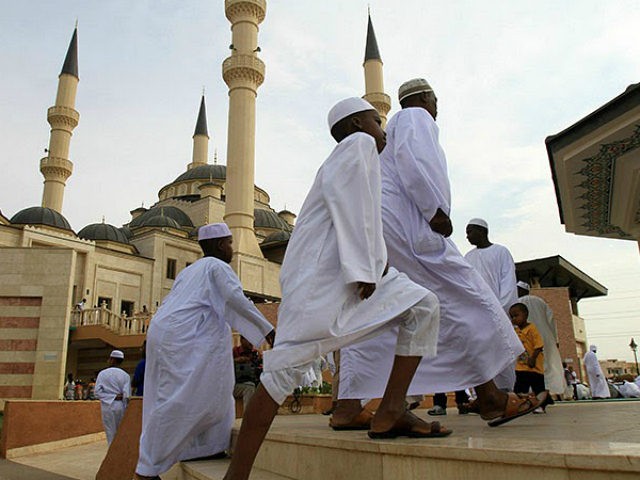Young boys enrolled in Sudan’s state-run Islamic schools face beatings, torture, and sexual abuse at the hands of older students and teachers, according to a report by BBC Arabic published on Monday.
BBC Arabic reporter Fateh al-Rahman al-Hamdani secretly filmed inside 23 of Sudan’s Islamic schools, known as khalwas, for two years starting in 2018. Hamdani, himself a former khalwa student, admitted in his report that he would try to get through each day at the khalwa he attended “without being beaten.”
Islam predominates in Sudan, where about 97 percent of the population is Muslim. Sudan’s government institutions have been largely controlled by Muslims since the country gained independence from Britain and Egypt in 1956. Khalwas have existed in Sudan for centuries and serve as an enduring example of these Muslim-dominated institutions. According to BBC Arabic, there are currently 30,000 khalwas in operation across Sudan.
The Islamic schools are run by sheikhs (Muslim leaders) “who usually provide food, drink and shelter, free of charge. As a result, poor families often send their children to khalwas instead of public schools,” according to the report.
During his two-year-long investigation for BBC Arabic, Hamdani said he witnessed children shuffling to daily Islamic prayers in shackles.
“I saw children – some as young as five – beaten and shackled like animals,” he wrote.
“One boy with deep, raw wounds around his ankles told me: ‘We can be in groups of six or seven all chained together, and they [the sheikhs] make us run around in circles. Whenever one of us falls over we have to get up again because they keep whipping us … They say that this is good for us,'” the reporter detailed.
Hamdani said, “one of the worst experiences” he had during his investigation was his visit to “a well-respected khalwa in Darfur” in 2018:
In a study room, under a hot corrugated iron roof, a small boy was held down and whipped more than 30 times by a teacher. The only sound in the room was the lashing of the whip and the boy’s anguished cries. I wanted to grab the whip and hit the sheikh, but I knew I couldn’t.
The reporter said he later contacted the school about the incident. The khalwa’s “sheikh confirmed they do beat children but denied this incident ever took place.”
Hamdani described a separate beating of “two 14-year-old boys, Mohamed Nader and Ismail” who were severely beaten by school leaders after being caught trying to escape their khalwa.
“When I visited them in hospital they were lying on their stomachs, unconscious, their backs stripped of flesh. They were beaten and tortured so badly they nearly died,” Hamdani wrote.
“They kept them in a room for five days without food or water,” Mohamed Nader’s father, Nader, told BBC Arabic.
“They rubbed tar all over their bodies. [Mohamed Nader] has been so badly beaten you can even see his spine,” his father said.
“I had filmed inside the same khalwa where this had happened, al-Khulafaa al-Rashideen, run by a man called Sheikh Hussein,” Hamdani recalled, adding that he had seen the room where the two boys were held.
“The conditions there were the worst I had seen. Most of the boys were shackled and teachers hovered over them with whips in case they made any mistakes. One student pointed out a room with barred windows, which he described as a prison. It was the room in which Ismail and Mohamed Nader had been kept,” he said.
Hamdani said he “kept in regular contact with the boys.” One of the boys, Mohamed Nader, opened up to the reporter several months after the incident.
“They tied me up and laid me on my stomach before whipping me,” he told Hamdani, who added that the beatings lasted for days.
“A lot of people came to beat us while the rest of the khalwa was asleep. After that, I don’t know what happened, I woke up in the hospital,” Mohamed Nader said.
Police in Darfur “charged two teachers with assault, who were later released on bail,” according to the report. Despite the arrests, the school remained open.
“There is rape in the khalwa. They would call you for it, in a macho way,” Mohamed Nader told Hamdani, adding that “the smaller or weaker boys were abused by older students.”
Hamdani said that “several other people” told him “that rape happened in the khalwa under the management of Sheikh Hussein.”
The reporter later returned to the khalwa to confront Sheikh Hussein about the allegations. Hussein “admitted that it was wrong to imprison children, but maintained that shackling was ‘packed with benefits’ and that ‘most khalwas use chaining, not just me,'” according to Hamdani. The sheikh added that “he had stopped using chains and that ‘the prison’ was now a storeroom.”
When Hamdani asked Hussein “about allegations of sexual abuse he became angry, categorically denying these claims and accusing me of attacking the Qu’ran,” the reporter revealed.
Sudan’s “new transitional government is now conducting a survey of all khalwas” across the country, according to the report.
“There should be ‘no beating, torture, violation of human rights or children’s rights whatsoever’ inside khalwas,” Sudanese Minister of Religious Affairs Nasreddine Mufreh has said, promising future reform of the state-run schools.

COMMENTS
Please let us know if you're having issues with commenting.